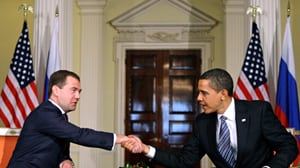
Is Barack Obama near a foreign-policy accomplishment to pair with health-care reform? “After a year of intense negotiations, the United States and Russia have agreed to the most comprehensive arms-control agreement in nearly two decades,” President Obama announced on Friday. The agreement stipulates that both countries cut their nuclear arsenals by about one-third. It will also implement a new, stronger verification regime and reduce missiles and launcher. Obama will go to Prague on April 8 to sign the treaty with Russian President Dmitry Medvedev, but will Congress go along? If Republicans insist on obstructing a new nuclear treaty with Russia, they could set off another Cold War. James Carroll on their dangerous game.
It’s one thing for Republicans to try to wreck the domestic centerpiece of American health-care reform, but what about the once-sacrosanct tradition of bipartisan foreign policy? President Obama and Russian President Dmitri A. Medvedev are putting the final touches on the U.S.-Russia arms-control treaty that will be signed in Prague early next month. This agreed resumption of the reduction of nuclear arms, which stalled badly more than a decade ago, may be the most urgent item on the world’s agenda. It’s the precondition for halting an explosion of nuclear proliferation and heading off a new arms race—one that includes China in the competition.
But all of this presumes the ratification of the U.S.-Russia treaty by the U.S. Senate. Fully two-thirds must vote yes. Democrat John Kerry and Republican Richard Lugar, respective leaders of the Foreign Relations Committee, assured President Obama that the treaty would be put before the Senate by year’s end, but how does that square with John McCain’s post-health care vow that from Republicans “there will be no cooperation for the rest of the year?” Will nay-saying Republicans scuttle the treaty, regardless of its merits, its historic necessity—and its tie to Ronald Reagan’s greatest legacy?
Should Republicans obey McCain’s vow, they will end up trashing what amounts to their own party’s single most historic modern achievement (second only, perhaps, to Lincoln’s abolition of slavery).
Should Republicans obey McCain’s vow, they will end up trashing what amounts to their own party’s single most historic modern achievement (second only, perhaps, to Lincoln’s abolition of slavery). After all, it was Ronald Reagan who initiated, w ith Mikhail Gorbachev, the treaty regime, beginning with the 1987 Intermediate Nuclear Forces Treaty, that reduced nuclear weapons and allowed the Cold War to end nonviolently. Under Reagan and George H.W. Bush, the U.S. nuclear arsenal was cut in half, with equivalent cuts in the Soviet and Russian arsenals. But such reductions stalled in the Clinton years, as partisan bitterness among Americans spilled over into the realm of national security in unprecedented ways. (Clinton could not get the Comprehensive Test Ban Treaty through the Senate, and it has yet to be ratified by the U.S.) George W. Bush showed what he thought of the treaty regime by revoking the Anti-Ballistic Missile Treaty in 2002 (for the sake of the Republican Holy Grail of missile defense), which prompted Russia to immediately drop out of START II, which in turn left as the only structure of Russian-American nuclear cooperation the START I treaty negotiated by Bush’s father. That expired last December, which is why the new Obama-Medvedev agreement is urgent.
The Senate probably won’t decide the treaty’s fate until later this year. But the signal Republicans send over the coming weeks will be decisive because open recalcitrance in the U.S. Senate (of the sort that defeated the no-brainer CTBT) will reinforce hawks in the Russian Duma, which must also vote to ratify. Blatant Republican negativity would also undermine Obama’s nuclear-security summit in Washington next month, at which more than 40 heads of state will gather. Likewise the Nuclear Non-Proliferation Treaty review conference a few weeks later in New York, a meeting at which the many non-nuclear states will need proof from nuclear states of seriousness about the nuclear weapons reduction-toward-abolition that that treaty already mandates.
Unfortunately, every sign in the political landscape points to the broad Republican refusal that McCain promised. The enflamed Republican base wants nothing to do with arms reduction, a “reset” with Russia, or a foreign-policy victory for Obama. And the Pentagon nuclear priesthood, defense contractors, and their acolytes on K Street don’t want this treaty either.
If the U.S. Senate fails to ratify what Obama and Medvedev have accomplished, look for the ignition of nuclear proliferation, and listen for the starter’s gun of that new arms race. See China run. The Republicans seem not to have yet grasped how much higher the stakes in their game just got. They aren’t playing with the mere health of Americans anymore, but with the extinction of the human species.
Correction: This article initially identified the Conventional Forces In Europe Treaty as the treaty that began nuclear arms reduction. It was the 1987 Intermediate Nuclear Forces Treaty.
James Carroll's recent book is Practicing Catholic, a story of American belief. He is a columnist for the Boston Globe and Distinguished-Scholar-in-Residence at Suffolk University. His other books include An American Requiem, which won the National Book Award, House of War, winner of the PEN-Galbraith Award, and Constantine's Sword, now an acclaimed documentary.






